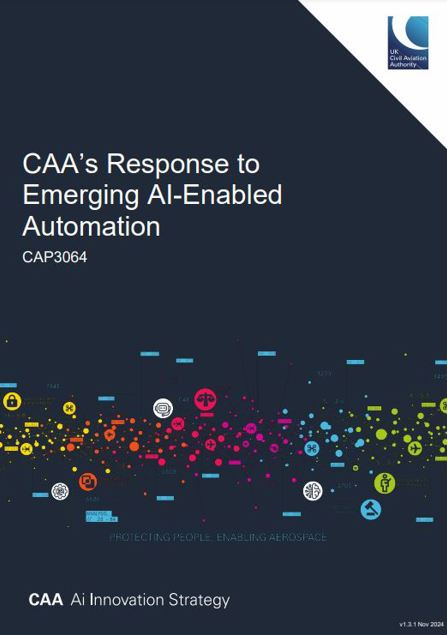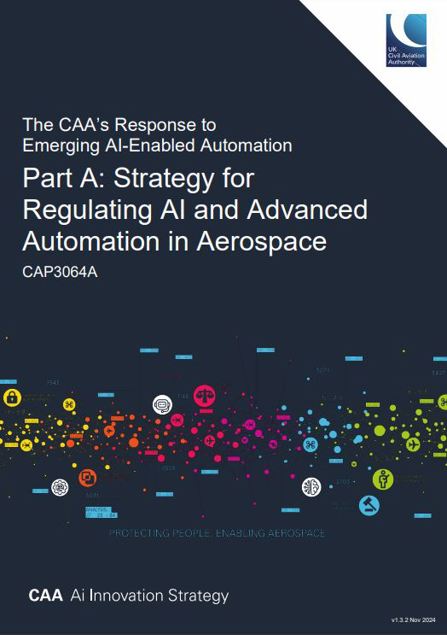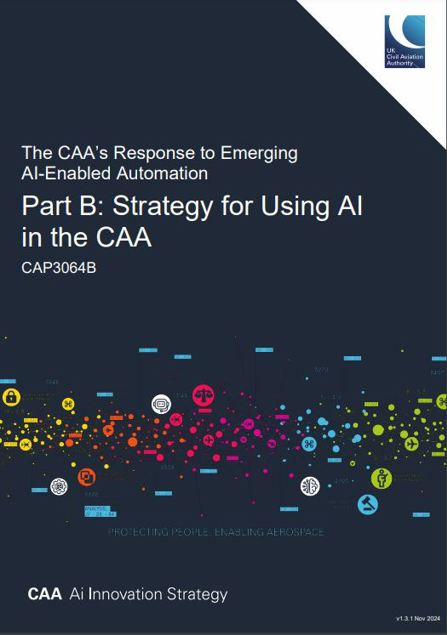We are now inviting stakeholders to participate in our survey to provide insights on the AI use cases being explored across the aerospace sector, inform our decision making and prioritisation, and help shape our regulatory requirements for the safe deployment of AI and advanced automation in aerospace. Through this survey, we aim to gather information on the current situation and plans for developing and deploying AI systems across aerospace, and on AI use cases being explored across all areas of the sector.
Introduction
The Civil Aviation Authority (CAA) is taking a proactive approach to artificial intelligence (AI) in aviation, focusing on both its safe regulation across the sector and its responsible use within our organisation. We aim to enable innovation while maintaining the highest standards of safety, security, and public trust.
Read our summary of the CAA's Response to Emerging AI-Enabled Automation.
Vision
To enable AI to enhance aerospace efficiency, sustainability, and scalability, while ensuring safety, security, consumer protection, and environmental sustainability through proportionate governance.
Our Strategic Response
AI presents both opportunities and challenges for aviation safety and efficiency. We will regulate AI across the sector while also using it responsibly within our own organisation to enhance our capabilities. Our AI Framework provides the foundation for building trust in AI through common language, ethical principles, and technological understanding.
To meet these challenges, we are working closely with international partners, standards bodies, and industry stakeholders. We aim to align our approach with global best practices while ensuring it meets the specific needs of UK aviation. This includes contributing to the development of standards and sharing knowledge with other regulators.
You can read our complete strategic response in these three documents:
- The CAA's Response to Emerging AI-Enabled Automation
- Strategy for Regulating AI in Aerospace (Part A)
- Strategy for Using AI in the CAA (Part B)
Our AI Framework
Our approach to AI is built on three core elements:
- Creating a common language for AI
- Building trust in AI through our 5 AI Principles
- Understanding the technology landscape
Regulating AI in Aviation
We are developing a robust regulatory framework to enable safe innovation in AI across the aviation sector. Our strategy for regulating AI outlines:
- Our approach to AI trustworthiness
- How we will assess and approve AI applications
- Our engagement with industry and standards bodies
- Research priorities and international collaboration
Using AI in the CAA
We are taking a measured approach to adopting AI within our own operations. Our strategy for using AI covers:
- Guidelines for safe and responsible AI use
- How we will enhance our regulatory capabilities
- Support for colleagues using AI tools
- Our AI risk assessment framework
Get Involved
We welcome engagement from all customers, consumers, and members of the public as we implement our AI strategy. Contact us at StrategyforAI@caa.co.uk to:
- Provide feedback on our approach
- Share insights on AI in aviation
- Discuss potential collaborations
- Ask questions about our AI work
Survey
We previously created a survey to gather insights on how we regulate AI. We are grateful for all of the responses received and your support in helping us to create a strategy for the safe and secure use of AI in aviation. The survey closed on Friday 29 March 2024, we have now published our summary of responses.
For more information or for any queries you have on our work on AI please contact StrategyforAI@caa.co.uk
Editions
News from UK Civil Aviation Authority
- Experts appointed by regulator to strengthen economic regulation and support growth
- UK Civil Aviation Authority and Ministry of Defence join forces to build pathway into civil aviation for military personnel
- Regulator’s accessibility assistance report highlights progress made by most UK airports but finds three airports need improvement




